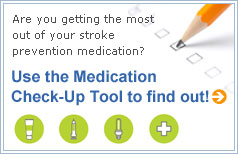Every 10 minutes on average, a Canadian has a stroke. Could you be next?
There are many things that increase your risk of a stroke (called stroke risk factors).
Some are things you can't control:
- age over 65
- male gender (women are also at risk after menopause)
- family history of stroke
- First Nations, African, or South Asian ancestry
- personal history of a stroke or TIA ("mini-stroke")
Fortunately, there are also many things you may be able to control:
Lifestyle issues:
- being overweight
- drinking too much alcohol (more than 2 drinks per day or 10 drinks per week for women or more than 3 drinks per day or 15 drinks per week for men)
- unhealthy diet (low in fruits and vegetables and high in sodium and saturated or trans fat)
- lack of physical activity
- smoking
- stress
Medical conditions:
Some people may have other risk factors not listed here.
Learn more about
understanding your stroke risk
and
how to reduce your risk of stroke.






